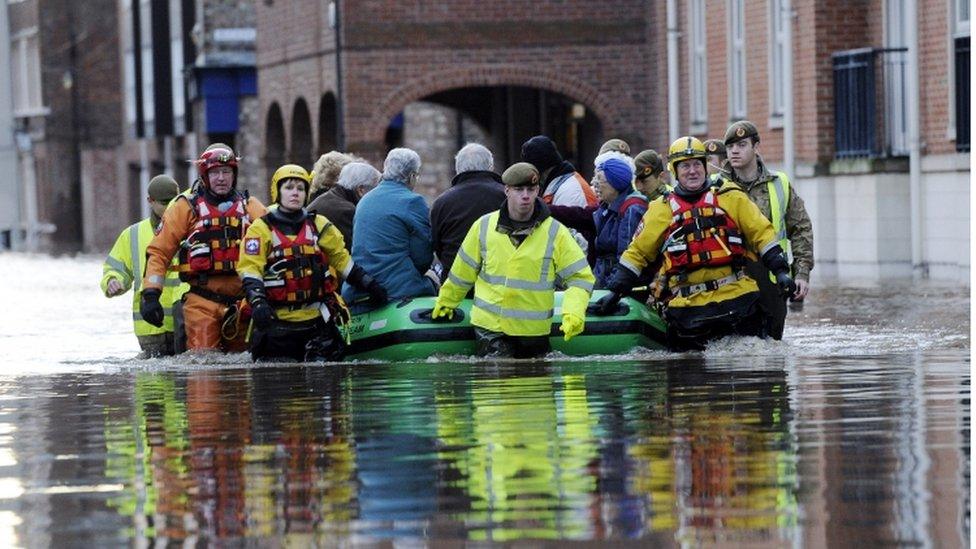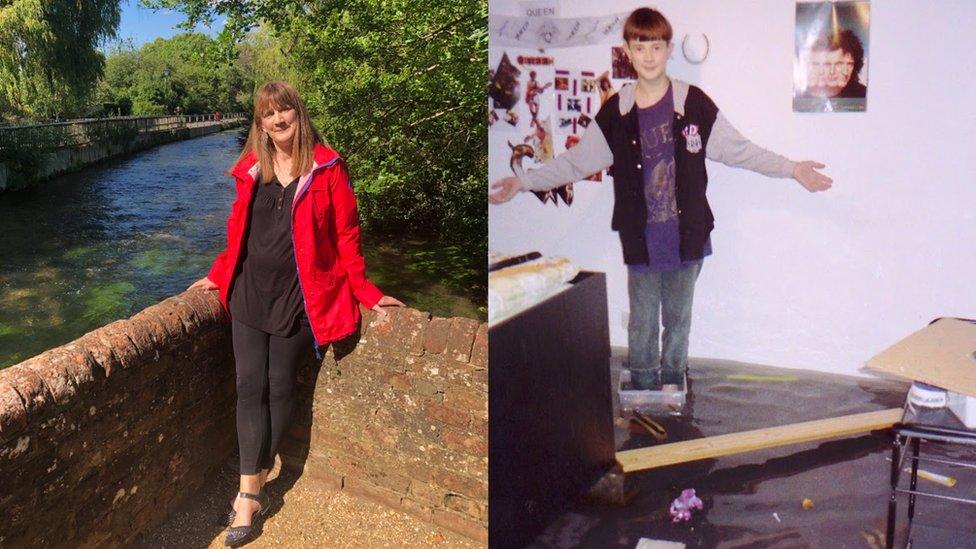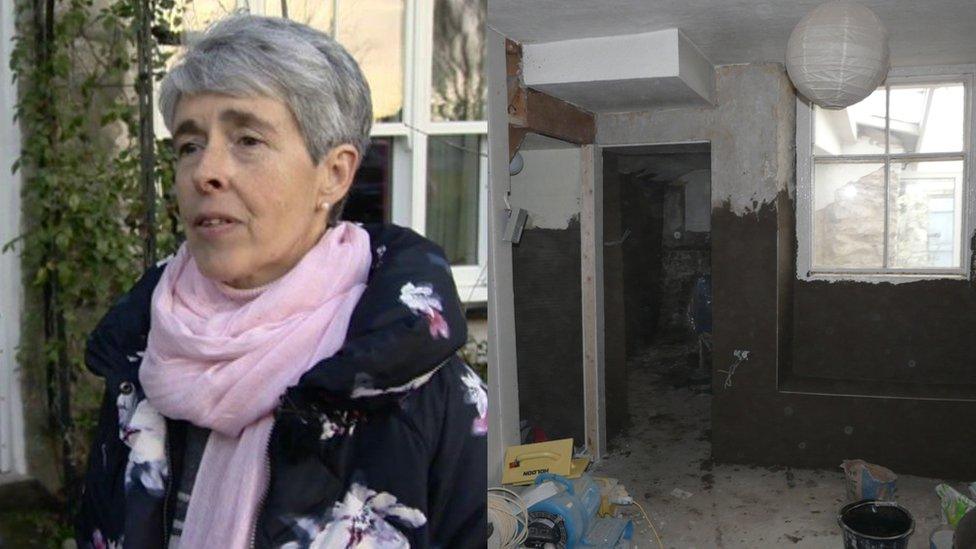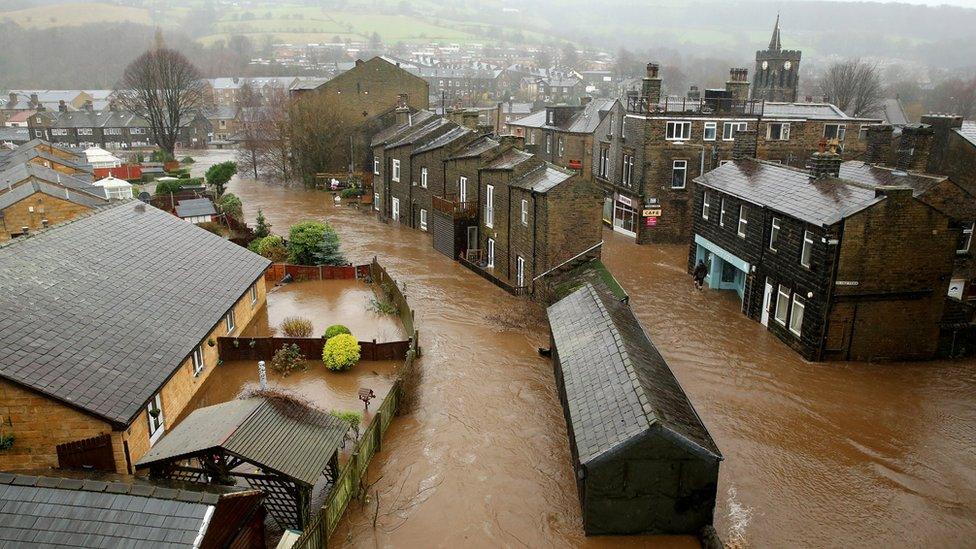UK Floods: Victims face mental health 'support vacuum'
- Published

Thousands of people were affected when York flooded in 2015
Flooding victims have told MPs they face a "support vacuum" when seeking long-term mental health treatment.
The environment select committee heard evidence, external that those affected had a 50% higher chance of stress or depression than the rest of the population.
"The waters receding do not repair the psychological, economic and physical impacts of flood damage," committee chair Neil Parish MP said.
The government said it was investing record amounts in flood resilience.
Mr Parish said: "Affected communities told us about the support vacuum they felt in the aftermath of flooding. It is high time that the government recognise this, and work with local authorities to properly resource mental health services for when the blue lights go."
BBC News has spoken to people who have experienced the trauma of their homes being flooded and the impact it has had on their mental health.
'Insufficient advice'

Mary Dhonau (left) says flooding has a long-lasting impact on the whole family
Mary Dhonau, from Worcester, has been flooded several times and now campaigns on the issues.
As major floods become more frequent, she said, services offering help and advice are stretched.
"There is insufficient post-traumatic stress disorder advice and there's insufficient practical advice," she said.
Mrs Dhonau said the impact was very difficult: "You lose all your possessions, all your treasured items, not just the fridges or the freezers, your photographs, all the things that insurance can't replace."
People also face cleaning up, dealing with insurers, managing repairs and, for many, living in temporary accommodation for months, she said.
"Then it is compounded by every time it rains hard you think 'is it going to happen again?' and the stress that revolves round that is absolutely huge."
'You find neighbours crying'

Lesley Hilton's North Yorkshire home was hit by flash floods in July 2019
When flash flooding hit the Yorkshire Dales in July 2019 a lack of advice was something Lesley Hilton, from Bellerby, experienced.
"Nobody came round to see how we were, nobody helped," she said.
"You say to yourself: 'well nobody died it's only stuff', but you don't feel safe in your own home anymore because you know these things can happen again.
"As it was happening it was like watching a television programme and then, after a couple of weeks it kicked in, and I think I was suffering from post-traumatic stress disorder."
She said the fear of flooding never goes away.
"You find neighbours crying because it is raining again," she said.
'We were offered massages'

Lis Dales says more talking therapies would have helped her and others affected by Storm Desmond
Lis Dales, from Kendal, Cumbria, experienced severe flooding during Storm Desmond in 2015 and said she had been asking for more mental health support for five years.
"It was very hit-and-miss, it was all volunteers.
"What we needed was a co-ordinated approach, especially on the mental health side.
"Why were we offered massages? What we needed was talking therapies, which we had to wait six months for, and then only got six one-hour sessions.
"The damage is done by then, there's loads of evidence to show that actually the peak of the stress response is probably nine months after the flood event," she said.
She said getting help to people as early as possible was essential.
In response to the select committee report, a government spokesperson said it was investing £5.2bn in 2,000 new defences to better protect more than 300,000 homes.
They added that the Environment Agency's Flood & Coastal Erosion Risk Management Strategy aimed to create a nation ready for, and resilient to, flooding and coastal change.
"This includes recognising the impacts of flooding on people's mental health. By 2025 the Environment Agency will work with government, other risk management authorities and public health services to ensure the mental health impacts from flooding and coastal change are factored into long-term recovery planning."
- Published25 December 2019
